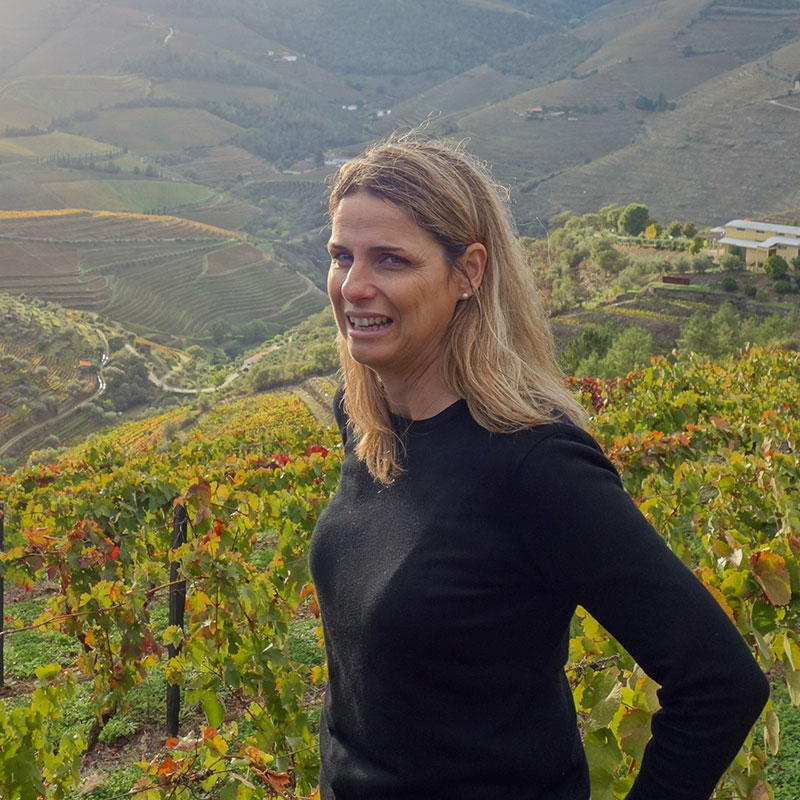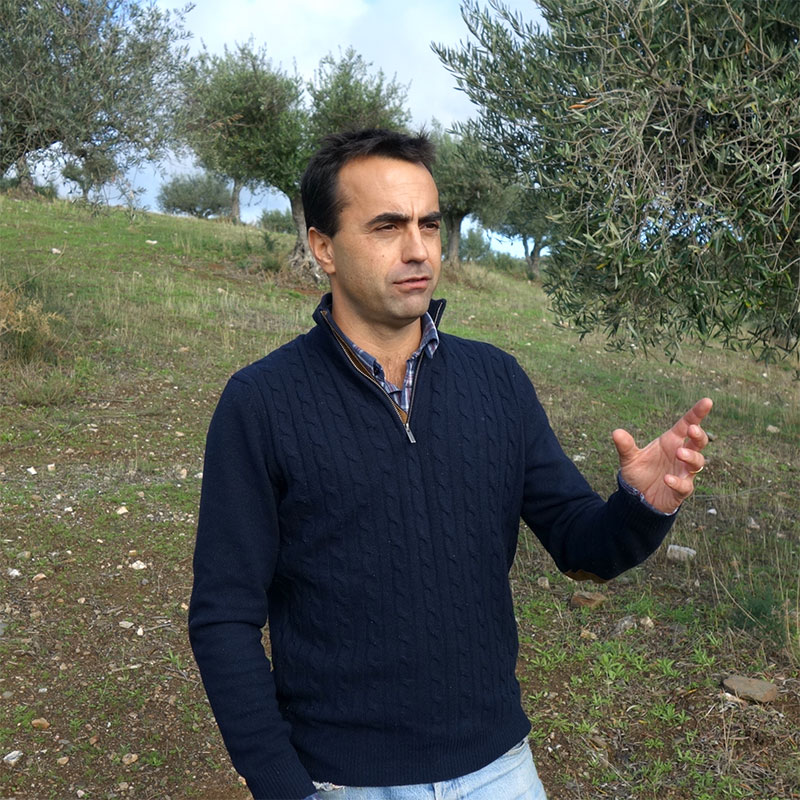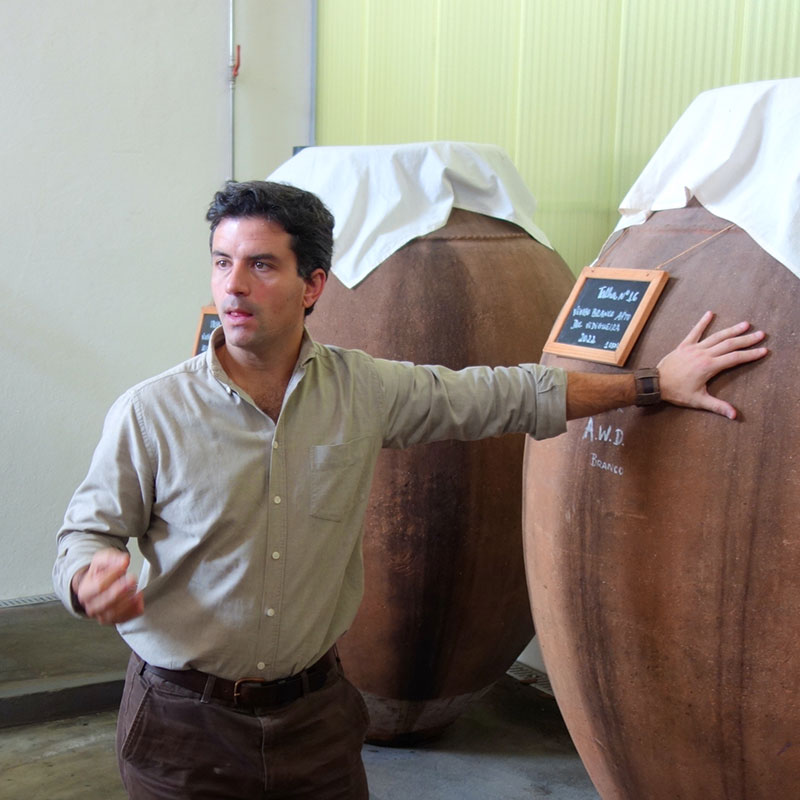Portugal offers a great, undiscovered wine diversity. Viticulture and with it tourism are being modernised and are waiting to be discovered. Alexander Lupersböck travelled across the country.
Curtains open, and then: a wow effect like seldom before in my life. From my hotel room I look down on the famous steel bridge Ponte Luis I, built by Eiffel student Théophile Seyrig, one of the landmarks of Porto. This is possible because the entrance of our hotel Vincci Ponte de Ferro is right next to the bridge approach, the rooms are built into the hillside below. A trip that begins with such a breathtaking view simply has to be good.
And I am not disappointed: already at dinner with the likeable and witty Luis Cerdeira from the Quinta de Soalheiro, I cannot get out of the feel-good zone. His Vinho Verde show a fascinating variety of terroir expressions and maturation stages, from granite and unfiltered to espumante and seven years matured. Vinho Verde only fresh and green? Not at all. Behind the designation lies an entire wine universe.
Just as Portugal offers a whole treasure chest of wines. 250 grape varieties are cultivated on 224,000 hectares, and most of them are autochthonous. So if you've had enough of Chardonnay, Cabernet or Pinot Noir, you should dive in here. Especially in red wine cuvées, there are always new names and compositions. More and more wineries are working with amphorae and orange wines. The variety of soil formations, microclimates allows for an enormously wide spectrum of wines. More about history, grape varieties and growing areas.
The next day, correctly cool and rainy for the time of year (autumn) and the area, we head north towards the Douro Valley. Before crossing spectacular stretches of motorway and bridges that make even the Brenner autobahn seem like a boring highway, we visit Aveleda. This is more than a winery: it is a small village within a village, with gardens and ponds, an original 19th century kitchen and a large storage cellar for brandy.

"There are more grape varieties here than inhabitants" - this saying aptly describes the Douro Valley. If you love wine, solitude and steep slopes, this is the place to be. In the past, boats were the fastest connection to the valley, later the railway came. Today it only takes about two hours to get from Porto to Pinhao. More and more people are visiting the valley on river cruise ships. For them, a visit to a winery is always part of the trip. But the drive over narrow roads along the slopes opens up new views and insights around every bend. The Douro and its tributaries squeeze through steep slopes, most of which are terraced for viticulture. You get an idea of what people took on in the past - and still take on today - to produce wine. A little humility is in order.
Sandra Tavares da Silva is one of Portugal's best-known winemakers. Her "Wine&Soul" winery is as glued to the hillside as the village of Vale de Mendez and the vineyards. Anyone who has ever helped with vineyard work knows immediately: here, every move is hard work, every grape must be wrung from the slope. This also charges the wines with a special tension - in addition to the slate soils and the great differences in temperature.
Sandra Tavares and her husband Jorge Borges founded this winery with the aim of preserving the incredible grape variety diversity of the Douro and its tributary Pinhao: "We really wanted to find old vines in different places". Now they have identified 42 varieties, some vines are up to 120 years old. They come from steep terraces that rise to 700 metres above sea level. Their wines reflect this richness, but also the warmth of their hosts. Sandra Tavares invites us to her private home for dinner, and the feeling is that of visiting old friends. So it becomes clear why Sandra and Jorge have named their winery "Wine&Soul".
The next rainy morning we head for the northernmost tip of the Duero region, Jerusalém do Romeu. Unlike in the Douro Valley, viticulture is the exception here. The Quinta do Romeu winery is a wine exclave. It is situated on a hill between two rivers and has no direct neighbours. One looks in vain for vineyards. This provides the best conditions for biodynamic cultivation. For this purpose, 37 permanent employees are employed. Co-owner João Menéres, whose family has lived here since 1874, describes Romeu as follows: "Nothing is flat here. Not the landscape, not the climate, not the flavours - and not the people either." So it's no surprise that there is a museum of curiosities in the village. With less plant and soil cultivation, Menéres focuses on close observation of the roots of the vines and the slate and clay soils. The winery includes the Maria Rita restaurant in the picturesque village - considered one of the most authentic in northern Portugal.

The location of the CVR Dão, the Interprofessional Commission of the DOC Dão, has probably been the envy of many. It is located in a former bishop's palace in the pretty town of Viseu. The abandoned palace chapel serves as the meeting hall. The information point and the regional wine shop are not to be missed. There you can discover good wines at surprisingly reasonable prices. For example, from Quinta da Fata or Quinta dos Roques. The Encruzado grape produces spicy, fresh white wines, while the red variety Jaen recently came to astonishing honours: A British wine magazine reported that six still unknown grape varieties had been discovered in Peru, among them Jaen. You could have asked Luis Lourenço about it, because he has been cultivating and knowing the variety here for a long time: "It makes simple wines, but it is also easy to grow. That's why the small farmers like it: Jaen pays their bills." In Viseu, in addition to several other churches and a nice pedestrian zone to stroll along, you can go to the Palace Viseu restaurant to enjoy authentic Portuguese cuisine.

On the way to the region south of the Tagus, huge plantations of fruit and almonds catch our eye. Our bus driver Manuel growls, "In 40 years this will all be desert." The reason for this is that the Californian almond industry, which is running out of water in the USA, found the best conditions for cultivation in Portugal and planted monocultures here with the permission of the authorities. Now there are many lakes and reservoirs that pretend to have a good water supply. But the extremely water-intensive cultivation of almonds will probably exhaust these reserves soon.
David Rego of the Herdade de Rocim winery is trying to counteract this with organic and partly biodynamic cultivation. Whereby the pure organic certification is not as important for many Portuguese winegrowers as their own sustainability programmes. "Organic is good for the vineyards and grapes, but sustainability also includes the people and social as well as cultural aspects," he explains and happily tells us that some bird species have reestablished themselves in Cuba that could not be observed there for many years. 90 people work on the 120 hectares of vineyards and olive groves at Herdade de Rocim. Around one tenth of the wines are vinified in amphorae - an age-old tradition on an ultra-modern winery. In the talhas, small amphorae made from local clay, restaurants in the area keep their own house wines. There is even a separate DOC for this in the Alentejo. After all, the most expensive red wine in Portugal to date was bottled from a talha and cost 1,000 euros per bottle.
Herdade de Rocim not only cultivates this custom, it also organises an annual international amphora festival in November with wineries from all over the world. Interested parties should book in good time, because Cuba is away from the big tourist centres. The 1,000 or so tickets are therefore always sold out quickly. Extensive cork oak forests all around give a real Portugal feeling.
Portugal is currently trying to attract not only almond producers but also international technology companies to the country. With well-educated university graduates, it wants to become the European Silicon Valley. It is certainly attractive here: beaches, good food and above all the open and friendly nature of the people make it easy to feel at home here. There are few countries that offer more variety.
Note: The trip was made at the invitation of Wines of Portugal.
.jpg)
R. do Casino da Ponte 1, 4430-999 Vila Nova de Gaia Porto
+351 967 830 078
Right next to and below (!) the Eiffel Bridge Ponte Maria Pia. Modern, cosy and with priceless views of Porto's most famous building. The port wine houses of Vila Nova da Gaia are in the immediate vicinity.
R. Cel. Raul Peres, 4150-155 Porto
Located on the beach of Porto. With a bar and club, it's mainly a meeting place for young people, who also enjoy cocktails and wonderful fish and seafood here.
The vineyards are located at the northernmost tip (point) of Portugal between 400 and 600 m above sea level and are surrounded by mountains up to 1,500 m high. Now in its third generation, Luis Cerdeira and his family produce various types of Vinho Verde, including sparkling wines.
Wine tips:
Quinta de Soalheiro Alvaredo Melgaço
4960-010 Alvaredo (MLG)
Luis Cerdeira
+351 965 057 735
On the way to the Douro Valley, you should plan a visit to Aveleda. The 150-year-old winery is a small village with a park, pond and many pretty details. You can discover it on a guided tour. Aveleda makes wines from five regions of Portugal and is the largest producer and exporter of Vinho Verde. Flagship is the red wine Quinta Vale d. Maria Douro from vines over 80 years old and 41 grape varieties.
Wine tips:
Quinta da Aveleda
Rua da Aveleda n 2
4560-570 Penafiel
+351 935863612
"Mr. Alvarinho" also has a heart for other grape varieties such as the red Alvarelhão in the Minho Valley or the animating Loureiro. The Atlantic climate with high summer temperatures and frequent rainfall make it difficult to work organically. Nevertheless, grapes are grown in an integrated and sustainable way.
Wine Tip:
Anselmo Mendes Vinhos
Zona Industrial De Penso, Lote 2
4960-310 Melga O 727
This large winery has sites in the Vinho Verde and Tagus regions. Since 2004, quality wines have also been produced. Tastings can be booked at Quinta da Hospital in Monção, founded in the 12th century, and at the winery in Almeirim. Cooking is also available for groups.
Wine Tip:
Falua Sociedade de Vinhos
Zona Industrial Lot 56
2080-221 Almeirim
+351 243 594 280
This well-known winery focuses on wine tourists and offers a guesthouse with pool and "Wine&Food Experiences". In the restaurant you can enjoy the Portal wines with various menus. Or the craft beer matured in wine barrels.
Wine Tip:
Quinta do Portal EN 323
5060-020 Celeirós
+351 968 120 127
Tastings are available by appointment.
Wine tips:
Wine & Soul
Ava Julio de Freitas 6
5085-101 Vale de Mendiz
+351 936 161 408
The family winery produces Douro and Port wines on around 100 ha. Since 2011, the estate has been using organic farming methods. The Port wines are fortified later than at most other wineries.
Wine Tip:
Quinta Sra. Rosário
5130-326 S.
João da Pesqueira
Specialising in sparkling wines, this winery was founded in 1989 with the owner of leading US sparkling wine producer Schramsberg. Jack Davies accepted an invitation from João Carvalho Maia and recognised the potential of the northern Douro for sparkling wines. The 550m altitude and granite soils provide a distinctive acid structure, so the wines need bottle ageing.
Wine Tip:
Caves Transmontanas
Rua S. Domingos nº 22
The team of Caves Transmontanas started a project in 1998 to evaluate ten different terroirs in the Douro. Two of the vineyards passed the test. There, true to the motto "the terroir determines the character of the wine, the quality is a consequence of human activity", wines with character of origin are vinified.
Wine tips:
Quanta Terra
R. da Casa do Douro
5070-262 Favaios
This small family winery produces straightforward, fresh, elegant wines at very attractive prices from 20 hectares under integrated cultivation.
Wine tips:
Quinta da Fata
Rua Prof. Machado
Macedo 5 3°B 1300-609
The 40 ha family-run winery divides its range into the brands Quinta das Maias with organic wines and Quinta dos Roques with conventional wines. Since 1980, the production for own consumption has become a professional winery.
Tasting sessions with food are available by appointment.
Wine tips:
Quinta dos Roques
Rua da Paz
Abrunhosa do Mato
3530-050 Cunha Baixa
In addition to 450 ha of vineyards in Portugal, the company, founded in 1990, also owns 150 ha in Brazil. The Cabriz brand is the best known from Dão. At Quinta de Cabriz, visitors are welcomed for tastings and in the restaurant.
Wine tips:
Quinta de Cabriz
Quinta das Sarzedas
3430-144 Carregal do Sal
The amphora wine festival in autumn is the tourist highlight, but visitors are welcome (by appointment) at any time.
Wine tips:
Herdade de Rocim
Estrada nacional 387
7940-909 Cuba
The 1,000 ha estate is characterised by several lakes formed by four dams. Olives, carob and 30 ha of vines are cultivated, all certified organic and sustainable. Reforestation projects, biodiversity and bird conservation are just some of the concerns of this oasis.
Wine tips:
Herdade dos Lagos
Vale de Acor de Cima, CX.P.43
7750-056 Mértola
With 350 ha and an annual production of 6 million bottles, the Relvas family winery is one of the largest in the region with an impressive winery building. The fifth generation of the family also places great emphasis on tradition: Wines from talhas and amphorae are part of the range.
Wine tips:
Herdade da Pimienta
7005-752 São Miguel de Machede
The winery has been in the hands of the Castelo Branco family for over three centuries. In addition to wine, they also raise olives, almonds, cattle and pigs on the banks of the Guadiana River according to strict Portuguese sustainability regulations.
Wine tips:
Herdade Paço de Conde
Monte Paço de Conde, 462
7800-611 Baleizâo
The Aleixo family has been cultivating the winemaking craft since 1951 with grape varieties such as the white Bical and the red Baga. The sea and its mists have a great influence on the taste of the wines. The winery also offers very mature wines.
Wine tips:
Real Cave do Cedro
Rua do Rossio 49
3780-594 Poutena